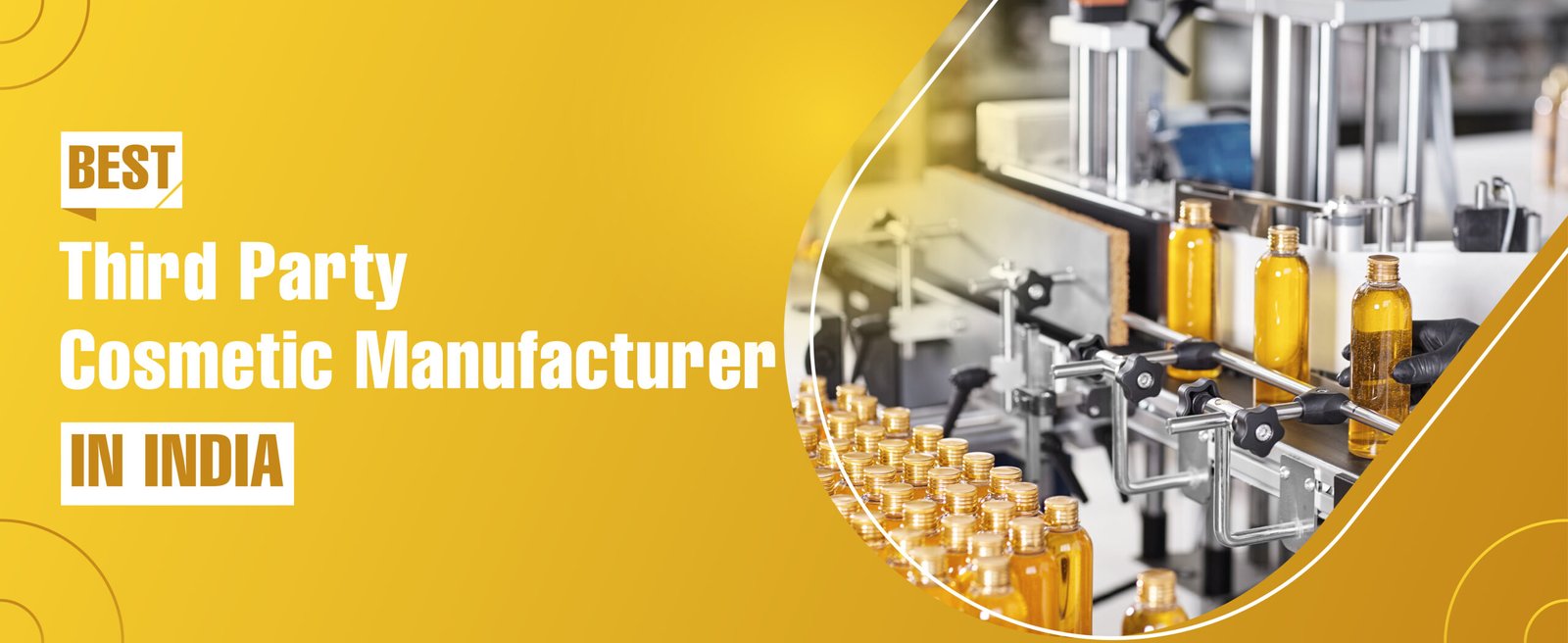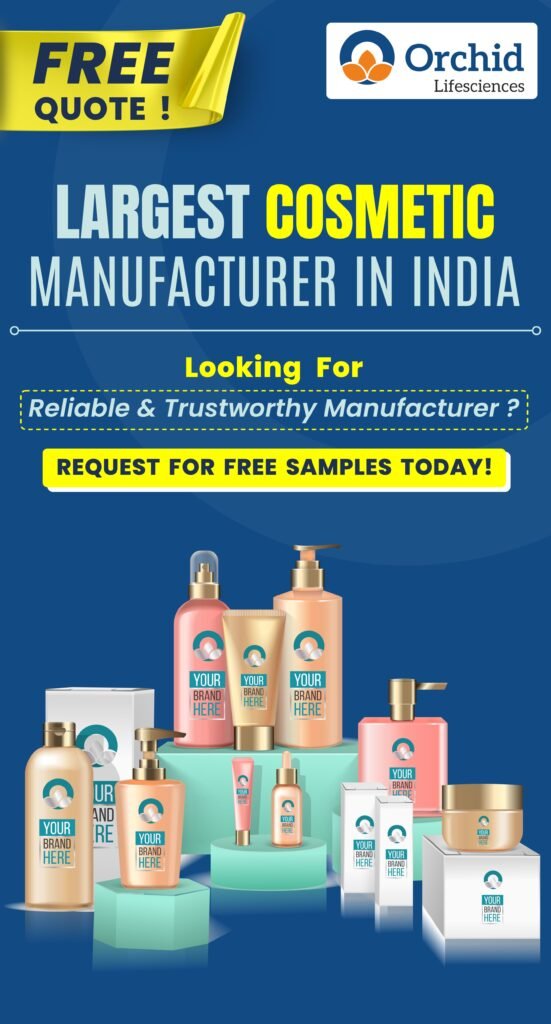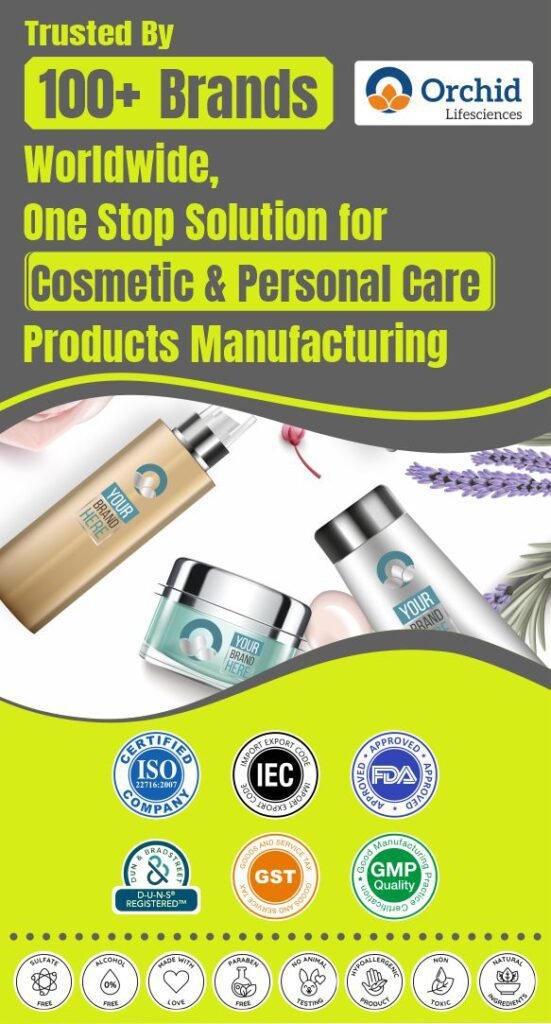What is Third Party Cosmetic Manufacturing?
Third-party cosmetic manufacturing, or contract manufacturing, involves the production of cosmetic products by one company on behalf of another. In this arrangement, a cosmetic brand outsources the manufacturing process to a third-party manufacturer who specializes in producing high-quality cosmetic products under the brand’s name.
This model allows cosmetic brands to focus on marketing, branding, and distribution, while the third party manufacturer takes care of the production, quality control, and sometimes even packaging.
The Rise of Third Party Manufacturing in India
India’s third-party cosmetic manufacturing sector has grown significantly, fueled by several factors:
1. Cost Efficiency:
Outsourcing production to third-party manufacturers helps brands reduce overhead costs, as they do not need to invest in manufacturing facilities, equipment, or labour.
2. Expertise:
Third party manufacturers often possess specialized knowledge and experience in cosmetic formulation and production, ensuring that the products meet industry standards.
3. Flexibility:
Brands can easily scale production up or down based on market demand without the need to maintain costly production facilities.
4. Speed to Market:
With established manufacturing processes and infrastructure, third-party manufacturers can help brands bring their products to market faster.
Key Players in India’s Third-Party Cosmetic Manufacturing Industry
1. Orchid Lifesciences
Orchid Lifesciences is a leading third-party cosmetic manufacturer in India, known for its high-quality products and state-of-the-art manufacturing facilities. The company specializes in a wide range of cosmetic products, including skincare, haircare, and personal care items.
Orchid Lifesciences offers comprehensive contract manufacturing services, including formulation development, production, quality control, and packaging. The company adheres to international quality standards and is ISO and GMP-certified.
Orchid Lifesciences produces a variety of products, including face creams, lotions, shampoos, conditioners, serums, and more. The company is also known for its expertise in herbal and Ayurvedic formulations, catering to the growing demand for natural and organic cosmetics.
Address:
Plot No. 68-72, Tribhuvan Industrial Estate, Road No.11, Nr. Kathwada GIDC, Kathwada, Ahmedabad, Gujarat-382430
Contact:
+91-8980815444
+91-9898026828
+91-9922840985
Email – marketing@orchidlifesciences.com
Website:
https://orchidlifesciences.com/
2. Maybelline
Maybelline is another prominent third party cosmetic manufacturer in India, offering a wide range of cosmetic and personal care products. The company is known for its innovative formulations and commitment to quality.
Maybelline provides end-to-end manufacturing services, from product conceptualization to final production. The company’s manufacturing facilities are equipped with advanced technology and machinery, ensuring efficient and high quality production.
Maybelline produces a wide array of products, including skincare, haircare, color cosmetics, and personal hygiene items. The company also offers customized formulations to meet specific brand requirements.
3. Nykaa
Nykaa is a well established third party cosmetic manufacturer in India, specializing in the production of dermatologically tested skincare products. The company has a strong reputation for quality and innovation.
Nykaa offers a full range of contract manufacturing services, including formulation development, production, and packaging. Nykaa’s facilities are GMP certified and adhere to strict quality control measures.
Nykaa product portfolio includes creams, lotions, serums, sunscreens, and anti aging products. Nykaa is known for its focus on research and development, offering advanced formulations that cater to the needs of the modern consumer.
4. MAC Cosmetics
MAC Cosmetics is a leading private label and third-party cosmetic manufacturer in India, specializing in natural and organic products. The company has gained recognition for its commitment to sustainability and eco-friendly manufacturing practices.
MAC Cosmetics provides comprehensive manufacturing services, from product formulation to packaging. The company’s facilities are equipped with the latest technology and follow GMP guidelines to ensure the highest quality standards.
MAC Cosmetic’s product range includes skincare, haircare, bath and body products, and essential oils. The company is particularly known for its expertise in Ayurvedic and herbal formulations, catering to the growing demand for natural cosmetics.
5. Lakme Cosmetics
Lakme Cosmetics is one of the largest third-party cosmetic manufacturers in India, with a strong presence in both the domestic and international markets. The company offers a wide range of cosmetic products, including colour cosmetics, skincare, and haircare items.
Lakme Cosmetics provides end-to-end manufacturing solutions, including product development, production, quality assurance, and packaging. The company’s manufacturing facilities are ISO certified and equipped with state-of-the-art technology.
Lakme Cosmetics produces a diverse range of products, including lipsticks, foundations, eyeshadows, shampoos, conditioners, and skincare products. The company is known for its ability to produce large volumes of high-quality products, making it a preferred partner for many leading cosmetic brands.
The Manufacturing Process in Third Party Cosmetic Production
The manufacturing process in third-party cosmetic production involves several critical steps to ensure that the final product meets the brand’s specifications and quality standards.
1. Formulation Development
- Custom Formulations: Third party manufacturers often work closely with brands to develop custom formulations that align with the brand’s vision and market positioning. This process involves selecting the right ingredients, determining the appropriate concentrations, and conducting stability and efficacy tests.
- Existing Formulations: Brands can also choose from a range of existing formulations offered by the manufacturer, which can be customized with specific scents, colours, and packaging options.
2. Ingredient Sourcing
- Quality Control: The quality of the final product is heavily dependent on the quality of the raw materials used. Third-party manufacturers typically source ingredients from trusted suppliers and conduct rigorous quality checks to ensure purity and safety.
- Natural and Organic Ingredients: With the growing demand for natural and organic cosmetics, many third-party manufacturers in India specialize in sourcing sustainable and eco-friendly ingredients, such as herbal extracts, essential oils, and plant-based actives.
3. Production and Manufacturing
- Batch Production: Once the formulation is finalized, the production process begins. Third-party manufacturers use advanced machinery and technology to produce large batches of cosmetic products while maintaining consistency and quality.
- Quality Assurance: Throughout the production process, quality assurance teams conduct regular inspections and tests to ensure that the products meet the brand’s specifications and industry standards. This includes microbiological testing, stability testing, and sensory evaluations.
4. Packaging and Labeling
- Custom Packaging: Third-party manufacturers offer a range of packaging options, from standard containers to custom-designed packaging that reflects the brand’s identity. This can include bottles, tubes, jars, and compacts made from various materials, including plastic, glass, and metal.
- Labelling Compliance: The labelling of cosmetic products must comply with regulatory requirements, including ingredient lists, usage instructions, and safety warnings. Third-party manufacturers typically handle the labeling process, ensuring that all information is accurate and compliant with local regulations.
5. Distribution and Logistics
- Supply Chain Management: Efficient supply chain management is crucial for ensuring that products reach the market on time. Third-party manufacturers often provide logistics and distribution services, managing everything from warehousing to shipping.
- Global Reach: For brands looking to enter international markets, third-party manufacturers can handle export logistics, ensuring that products meet the regulatory requirements of different countries.
Regulatory Environment and Compliance
The cosmetic industry in India is regulated by the Central Drugs Standard Control Organization (CDSCO) under the Ministry of Health and Family Welfare. Compliance with regulatory standards is essential for ensuring the safety and efficacy of cosmetic products.
1. Licensing and Registration
- Manufacturing License: Third party cosmetic manufacturers in India must obtain a manufacturing license from the CDSCO to produce cosmetic products. This license ensures that the manufacturer complies with Good Manufacturing Practices (GMP) and adheres to safety and quality standards.
- Product Registration: Certain cosmetic products, especially those intended for export, require product registration with the CDSCO. This process involves submitting detailed information about the product’s formulation, ingredients, and manufacturing process.
2. Labeling Requirements
- Ingredient Disclosure: The labeling of cosmetic products must include a complete list of ingredients, in descending order of concentration. This helps consumers make informed decisions about the products they use.
- Safety Warnings: Certain ingredients may require specific safety warnings on the label, especially if they are known to cause allergic reactions or other adverse effects.
3. Import and Export Regulations
- Import Regulations: Imported cosmetic products must comply with Indian regulatory standards, including ingredient safety and labelling requirements. Third-party manufacturers who import raw materials must ensure that these materials meet the necessary safety and quality standards.
- Export Regulations: When exporting cosmetic products, third-party manufacturers must comply with the regulatory requirements of the destination country. This may include obtaining product certifications, conducting additional safety tests, and complying with labelling requirements.
4. Quality Standards
- ISO and GMP Certification: Many third-party cosmetic manufacturers in India are ISO certified and follow GMP guidelines. These certifications ensure that the manufacturer adheres to strict quality control measures and produces safe, high-quality products.
Benefits of Collaborating Third Party Cosmetic Manufacturers in India
Third-party cosmetic manufacturing offers numerous benefits to brands, particularly those looking to enter the market or expand their product lines.
1. Cost Efficiency
- Lower Overhead Costs: By outsourcing production to a third-party manufacturer, brands can avoid the significant capital investment required to set up their own manufacturing facilities. This includes savings on equipment, labor, raw materials, and utilities.
- Economies of Scale: Third-party manufacturers often produce large volumes of products for multiple brands, allowing them to benefit from economies of scale. This results in lower production costs, which can be passed on to the brand, making third-party manufacturing a cost-effective option.
2. Access to Expertise
- Specialized Knowledge: Third party manufacturers possess specialized knowledge and experience in cosmetic formulation and production. This expertise ensures that products are developed and manufactured to the highest standards, meeting both regulatory requirements and consumer expectations.
- Innovation: Many third party manufacturers invest in research and development (R&D) to stay ahead of industry trends and offer innovative products. Brands can leverage this innovation to differentiate their products in a competitive market.
3. Flexibility and Scalability
- Customizable Production: Third party manufacturers offer a high degree of flexibility in production, allowing brands to customize formulations, packaging, and labeling to meet their specific needs. This is particularly beneficial for brands looking to create unique products that stand out in the market.
- Scalability: Third party manufacturing allows brands to scale production up or down based on market demand. This flexibility ensures that brands can respond quickly to changes in consumer preferences or market conditions.
4. Faster Time to Market
- Established Processes: Third-party manufacturers have established production processes, supply chains, and distribution networks, allowing brands to bring their products to market faster. This speed to market is crucial in the fast-paced beauty and personal care industry, where trends can change rapidly.
5. Focus on Core Competencies
- Branding and Marketing: By outsourcing production to a third-party manufacturer, brands can focus on their core competencies, such as branding, marketing, and sales. This allows them to allocate resources more effectively and build a stronger brand presence in the market.
Challenges faced by Third Party Cosmetic Manufacturers in India
While third-party cosmetic manufacturing offers numerous benefits, it also presents certain challenges that brands must consider.
1. Quality Control
- Ensuring Consistency: Maintaining consistent product quality can be challenging, especially when working with multiple third-party manufacturers. Brands must implement stringent quality control measures and regularly audit their manufacturing partners to ensure that products meet the required standards.
- Compliance with Standards: Brands must ensure that their third-party manufacturers comply with all relevant regulatory standards, including GMP and ISO certifications. Failure to comply can result in product recalls, legal issues, and damage to the brand’s reputation.
2. Intellectual Property
- Protecting Formulations: Intellectual property protection is a significant concern in third-party manufacturing. Brands must take steps to protect their proprietary formulations and prevent unauthorized use by the manufacturer or other clients.
- Confidentiality Agreements: Brands should establish confidentiality agreements with their third-party manufacturers to safeguard sensitive information, including product formulations, packaging designs, and marketing strategies.
3. Supply Chain Management
- Logistics and Distribution: Managing the supply chain can be complex, particularly when working with third-party manufacturers located in different regions. Brands must ensure that their products are delivered on time and in good condition, which requires effective coordination between the manufacturer, logistics providers, and retailers.
- Inventory Management: Brands must carefully manage inventory levels to avoid stockouts or overproduction. This requires accurate forecasting of demand and close collaboration with the third-party manufacturer.
4. Communication and Collaboration
- Maintaining Relationships: Effective communication and collaboration are essential for a successful partnership with a third-party manufacturer. Brands must establish clear lines of communication, set expectations, and regularly review the progress of production to ensure that the manufacturer is meeting their requirements.
- Resolving Issues: Challenges such as production delays, quality issues, or changes in demand may arise during the manufacturing process. Brands must be prepared to address these issues quickly and work with the manufacturer to find solutions.
Future Trends in Third Party Cosmetic Manufacturing
India’s third-party cosmetic manufacturing industry is poised for continued growth and is driven by several key trends.
1. Sustainability and Ethical Manufacturing
- Eco-Friendly Products: As consumers become more environmentally conscious, there is a growing demand for eco-friendly and sustainable cosmetic products. Third-party manufacturers are increasingly focusing on sustainable practices, such as using biodegradable packaging, sourcing sustainable raw materials, and reducing waste in production.
- Ethical Manufacturing: Brands are also placing greater emphasis on ethical manufacturing practices, including fair labour practices, cruelty-free production, and ethical sourcing of ingredients. Third-party manufacturers that prioritize these practices will be well-positioned to meet the demands of socially conscious consumers.
2. Personalization and Customization
- Customized Formulations: The trend towards personalized beauty products is driving demand for customized formulations. Third-party manufacturers are developing the capability to produce small-batch, bespoke products that cater to individual consumer preferences.
- Technology-Driven Personalization: Advances in technology, such as artificial intelligence and data analytics, are enabling brands to offer personalized beauty solutions. Third-party manufacturers are adopting these technologies to provide customized products that meet the specific needs of individual consumers.
3. Expansion into Emerging Markets
- Global Reach: Indian third-party cosmetic manufacturers are increasingly expanding their reach into emerging markets, such as Southeast Asia, Africa, and the Middle East. These regions offer significant growth opportunities due to rising disposable incomes, urbanization, and increasing consumer demand for beauty products.
- Adapting to Local Preferences: To succeed in these markets, third-party manufacturers must adapt their products to meet local consumer preferences, including cultural considerations, skin types, and climate conditions.
4. Digital Transformation
- E-Commerce Growth: The growth of e-commerce is transforming the beauty and personal care industry, offering new opportunities for third-party manufacturers. Brands can leverage online platforms to reach a broader audience and offer their products directly to consumers.
- Digital Marketing: Digital marketing is becoming increasingly important for brands in the beauty industry. Third-party manufacturers are incorporating digital tools, such as social media, influencer marketing, and content marketing, to help brands build their online presence and engage with consumers.
5. Innovation in Product Development
- Cutting-Edge Formulations: Third party manufacturers are investing in research and development to create cutting-edge formulations that meet the evolving needs of consumers. This includes developing products with advanced skincare benefits, such as anti-ageing, brightening, and hydration, as well as multifunctional products that offer multiple benefits in one.
- Natural and Organic Ingredients: The demand for natural and organic cosmetics is driving innovation in ingredient sourcing and formulation. Third-party manufacturers are exploring new natural ingredients, such as plant-based actives, botanicals, and essential oils, to create products that are both effective and safe for consumers.
Conclusion
The third-party cosmetic manufacturing industry in India is a dynamic and rapidly growing sector, offering significant opportunities for both brands and manufacturers. With its cost efficiency, access to expertise, flexibility, and speed to market, third-party manufacturing has become an essential component of the beauty and personal care industry. Leading manufacturers, such as Orchid Lifesciences, Vive Cosmetics, Cosmederma Remedies, Bo International, and Clarion Cosmetics, are at the forefront of this industry, providing high-quality products and innovative solutions to brands across the globe.
As the industry continues to evolve, third-party cosmetic manufacturers in India are well-positioned to meet the changing demands of consumers, driven by trends such as sustainability, personalization, and digital transformation. By embracing these trends and maintaining a strong focus on quality, compliance, and innovation, third-party manufacturers will continue to play a critical role in shaping the future of the beauty and personal care industry.
For brands looking to enter the market or expand their product offerings, partnering with a third-party cosmetic manufacturer in India offers a strategic advantage, enabling them to deliver high-quality, customized products to consumers while focusing on building their brand and driving growth in an increasingly competitive market.






